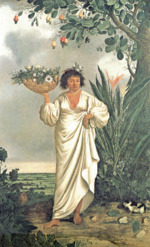Mameluco is a Portuguese word that denotes the first generation child of a European and an Amerindian. It corresponds to the Spanish word mestizo.
In the 17th and 18th centuries, Mameluco was used to refer to organized bands of slave-hunters, also known as bandeirantes, who roamed the interior of South America from the Atlantic Ocean to the foothills of the Andes, and from Paraguay to the Orinoco river, invading Guarani-occupied areas in search of slaves.
The word may have become common in Portugal in the Middle Ages, deriving from the Arabic, "Mamluk", "slave", commonly referring to soldiers and rulers of slave origin, especially in Egypt.
See also
- Amazonian Jews
- Caboclo
- Mestiço
- Mixed-race Brazilian
- Pardo Brazilians
External links
- Herbermann, Charles, ed. (1913). . Catholic Encyclopedia. New York: Robert Appleton Company.
